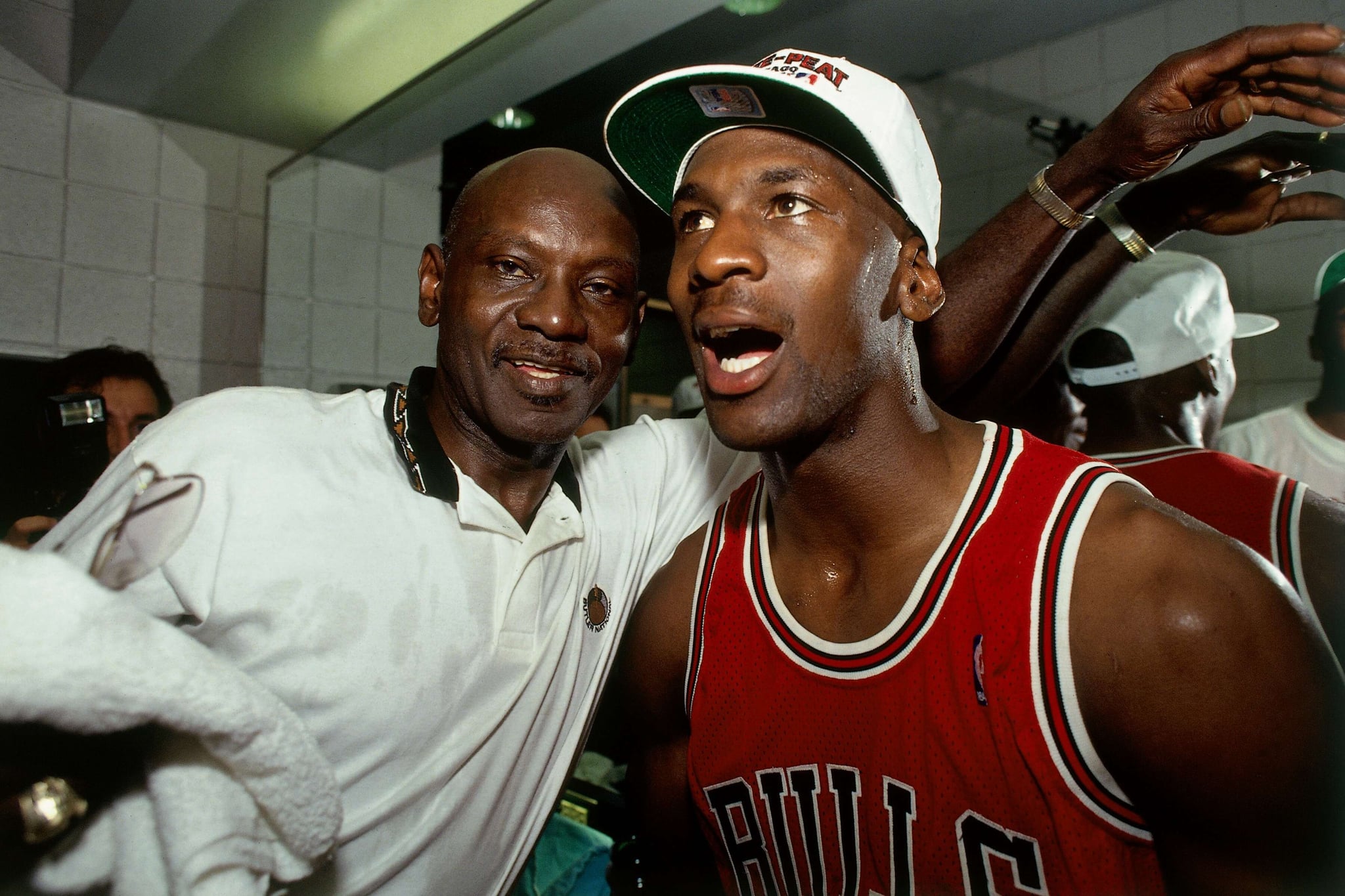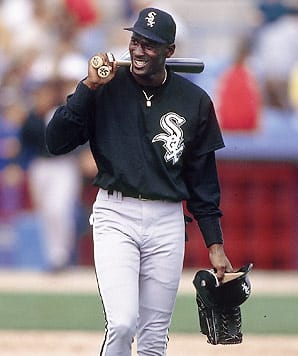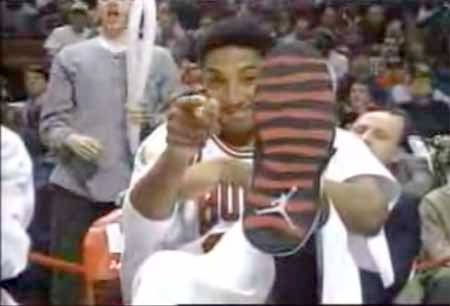Emotions were riding high on these episodes. Knowing where the year of 1993 was going to take us, I knew we were going to be ready for a bumpy, roller coaster ride.
 |
| Michael Jordan (on the right), with his dad (left) in better times in 1993. (Photo: Popsugar, via Hedy Phillips' article on Popsugar.) |
The aftermath of the 1993 season was rough. Michael Jordan lost his dad, as his father, James Jordan was murdered late July of that year, and amidst Jordan’s tumultuous dealings with the press, and the constant barrage of questions about his gambling habits, I think Michael Jordan losing his father combined with already having won 3 titles culminated with his decision to retire from the game of basketball.
Jordan retired for the first time on October 6th, 1993. That was a tough day. When I was re-watching the events that were unfolding, I was immediately filled with sadness. I knew the 1993-94 season wasn’t going to be easy for the Chicago Bulls, and I think Jordan mentally needed to step away from the game of basketball to take a break and to relieve himself from the burdens of all the things that had happened. It was a bittersweet moment for Jordan, because he was able to live a childhood dream of his and also fulfill a dream of his father's, which was to play baseball, but the tragic events that happened in 1993 were ultimately what led Jordan to step away from the game of basketball.
 |
| The greatest of all time, Michael Jordan giving baseball a try. (Photo: Sports Illustrated, via Ted Keith's article.) |
Michael Jordan also decided to play baseball for the Chicago White Sox’s organization, and in 1994, he suited for their minor league team, the Birmingham Barons, whom was a AA-baseball team. I thought it was an interesting venture for Jordan to go into. I thought at the time that it wouldn’t nearly as easy for him as basketball came to him, but I felt he was going to give baseball his all when he was there, and before he played baseball, I felt he would find a way to make it to the majors. I wasn’t so sure if I was ready to see him play baseball, but I was intrigued, and my curiosity was piqued.
 |
| Chicago Bulls' legendary forward, Scottie Pippen was named the 1994 NBA All-Star game MVP. (Photo: Nathaniel S. Butler/NBAE via Getty Images) |
Scottie Pippen became the leader and the primary superstar for the 1993-94 Chicago Bulls’ team, and I trusted that team to go far, as I felt that they had a chance to win it all once again. Pippen had a remarkable season that year individually, and he was also the All-Star Game MVP.
Toni Kukoc had a very good rookie season, and he truly impressed me with his versatility, dynaming playmaking skills, and he could throw down some mean dunks above the rim. The Steve Kerr signing was also a brilliant move on the Bulls’ part, and he would later prove to be a key piece to their later three-peat from 1996-98.
 |
| Chicago Bulls' star forward, Toni Kukoc made the game-winning shot in Game 3 of the 1994 playoffs against the New York Knicks. (Photo:John Biever /Sports Illustrated via Getty Images) |
Toni Kukoc would get one of his biggest moments of the 1994 season, as he made a heroic, game-winning shot to get the Chicago Bulls the win. But it was hard for me to re-watch the moment where Pippen chose to sit on the bench with seconds remaining in Game 3 of the 1994 playoffs against the New York Knicks.
From there, Pippen was left answering why his pride got in the way when he was told that the play wasn’t going to be drawn up for him to go for the game-winner, and that moment seemed to drive a wedge into the team. The Bulls played the Knicks tough, and they nearly won the series in the 6thgame at home, but they ultimately lost in 7 games on the road. It was clear that while the Bulls were still a very good team without Jordan, and that they had incredible ball movement, and operated very cohesively on offense, that they needed Jordan, someone who could dominate on both ends, take over with his scoring ability, and also be another player to bring shut down defense to their team.
Michael Jordan meanwhile started out strong at AA as he opened the season on a 13-game hitting streak. But then, word got out that he had trouble hitting breaking balls, and he went into a massive slump as a hitter. It got so bad that at one point, Sports Illustrated surprisingly bagged on him with a very mean-spirited cover. Jordan to this day it seems, has not forgiven SI for that.
He ended the year hitting .202, and with only 3 home runs to come with that despite playing a full season, but Michael Jordan did manage to steal 30 bases at that level, and showed potential as a rangy center fielder. Also, most minor-leaguers don't immediately start out at AA, as most players start their minor-league careers in rookie or A ball, and some players never make it to AA. The jury is out if Jordan would’ve made it to the majors if he had stuck with baseball, I’d like to think he still could’ve reached the majors, if primarily as a defensive specialist that could be a 4thor 5thoutfielder in the majors.
 |
| Scottie Pippen rockin' the Air Jordan X Chicago in 1995. (Photo: Sneaker Files, via Brian Betschart's article.) |
In 1995, there was the baseball strike, and baseball teams were trying to get minor-leaguers to cross the picket line to play for them. Jordan refused to go against the players’ union, and this turned out to be a great day in basketball history. His then teammate, B.J. Armstrong invited him to play one-on-one, and the rest was history. Jordan decided to return to the Chicago Bulls, with a simple statement declaring, “I’m back.”
The 1994-95 season had not gone too well for the Chicago Bulls, as they had been floundering in mediocrity with a 34-31 record as they lost several key members, most notably Horace Grant, a strong, athletic power forward that provided strong inside scoring, rebounding, and defensive skills.
 |
| Michael Jordan was back, as he returned during the middle of the season, but WAIT....you ask, is that him wearing the number 45?! (Photo: BRIAN BAHR/AFP via Getty Images) |
Michael Jordan came back, but showed some rust as his team lost in his first game back against the Pacers. Also what was notable was that he wore the number 45 this time, and not 23. It took him a few games to get back up to speed, or so it seemed, as he dropped 55 points against the New York Knicks a few games later to get his team the win on the road in the regular season.
The Chicago Bulls hit their stride, and found their groove, but they suddenly ran out of gas when they squared off against the Orlando Magic in the 1995 playoffs. Michael Jordan was tired towards the end of most games in that playoff series, his conditioning was not nearly at the peak level that we’re accustomed to seeing. Nick Anderson stole the ball away from him as the Bulls lost Game 1, and the Bulls would end up losing to Horace Grant, Shaq, and Penny Hardaway that year in 6 games. That was a crushing series defeat, but I knew Michael Jordan would come back ready and prepared in 1996.
 |
| Michael Jordan and Bugs Bunny filmed the movie, Space Jam together. (Photo: SGranitz/WireImage, via Getty Images) |
In the 1995 offseason, Michael Jordan started filming for the movie Space Jam, and he played in a bubble where he invited other athletes to train with him and play pick-up basketball with him. He was more motivated than ever, and he suddenly got back into peak physical condition to start the 1995-96 season.
 |
| Will Perdue was all the San Antonio Spurs got after trading Dennis Rodman to the Chicago Bulls. (Photo: Rocky Widner/NBAE via Getty Images) |
As for The San Antonio Spurs, the Spurs don’t make many bad moves, but then executive-Gregg Popovich made an incredibly foolish trade with the Bulls. I thought San Antonio’s side of the deal was bad then, and it looks really bad for them now. The Spurs did not even get one single draft pick out of that, are you kidding me? Ha! I'm not anti-Spurs or anything like that, and Gregg Popovich is now one of the greatest coaches of all-time along with Phil Jackson, and I truly respect Popovich as a person and coach, but here is my opinion of San Antonio's side of that deal.....
As a Chicago Bulls fan, I loved this move to acquire Rodman, and I regard this as one of the best moves that Jerry Krause has ever made. To get the best rebounder, and a tremendous defensive player at such a bargain like that, I had no doubt that the 1996 Chicago Bulls were absolutely going to win their fourth title. I was for sure certain that the Bulls were going to steamroll over their opponents to get the championship in 1996. And for the most part, they did, they went 72-10, and they did go on to win their fourth NBA title.
In the then-present, in the 1998 playoffs, The Chicago Bulls were able to sweep the New Jersey Nets, and Scott Burrell shined in Game 3 of the first round of the 1998 series. B.J. Armstrong ended up on the Charlotte Hornets, and he had a game of his own, as the Hornets surprisingly stole Game 2 away from the Chicago Bulls. But his bragging in Chicago would ultimately doom the Hornets, though Chicago was the much better team anyways, and the Bulls ended up winning the second round series in 5 games, 4-1.
Interestingly enough, B.J. Armstrong gives a tale of his own, where he gives an amusing tale of a 1993 game where the Bulls played against the Washington Bullets. 2nd-year guard, LaBradford Smith scored 37 points in his team's surprising road win over Chicago, and supposedly says, "Nice game, Michael." Michael Jordan then takes it upon himself to dominate and humiliate the kid, as Jordan scored 36 points in the first half alone against the Bullets in the next game in Washington D.C., and Smith was mentioned as having a terrible first-half as the Bulls go on to get a lopsided win. Unfortunately for LaBradford Smith, Smith only went on to play one more season in the NBA after that. Even more twisted, it is suggested that Michael Jordan made up LaBradford Smith's "Nice game, Michael" part of the anecdote just to give himself a greater edge to defeat a lowly Bullets team that only won 22 of 82 games in 1993.
Interestingly enough, B.J. Armstrong gives a tale of his own, where he gives an amusing tale of a 1993 game where the Bulls played against the Washington Bullets. 2nd-year guard, LaBradford Smith scored 37 points in his team's surprising road win over Chicago, and supposedly says, "Nice game, Michael." Michael Jordan then takes it upon himself to dominate and humiliate the kid, as Jordan scored 36 points in the first half alone against the Bullets in the next game in Washington D.C., and Smith was mentioned as having a terrible first-half as the Bulls go on to get a lopsided win. Unfortunately for LaBradford Smith, Smith only went on to play one more season in the NBA after that. Even more twisted, it is suggested that Michael Jordan made up LaBradford Smith's "Nice game, Michael" part of the anecdote just to give himself a greater edge to defeat a lowly Bullets team that only won 22 of 82 games in 1993.
The 1995-96 Chicago Bulls got off to a tremendous start, and they ended setting a then-record for the most wins in the regular season, as they went 72-10 to close out the regular season. The Bulls breezed past the Heat and the Knicks. In the 1996 Eastern Conference Finals, Michael Jordan was out looking for revenge against the Orlando Magic, and he got it. They easily handled the Orlando Magic in 4 games, as they swept them.
The Chicago Bulls would go on to face the Seattle SuperSonics in the 1996 NBA Finals. The Sonics were a very good team in the own right, but their chances to win the title were laughed off by many (including myself at the time), and it was thought that the Chicago Bulls would sweep them and then immediately be crowned as best team of all-time.
The 1996 Bulls almost did exactly that. After George Karl snubbed fellow North Carolina alum, Michael Jordan in a handshake line in the pre-game, Michael Jordan took it upon himself to dominate, and the Chicago Bulls won their first 3 games of the series. Then, Gary Payton took it upon himself to guard MJ, and the Sonics won two in Seattle, with the Payton to Shawn Kemp connection really working, and Payton was giving MJ some fits defensively. Shawn Kemp was throwing down alley-oop dunks, and Jordan was getting annoyed with Payton’s pesky defense. The tactical adjustment combined with being able to play in Seattle, and with the Bulls perhaps playing like they were bored, allowed the SuperSonics to steal two games in this series. But the Bulls were primed and ready for Game 6, and they made it their mission to close it out at home to win the series once and for all.
 |
| Michael Jordan with the Larry O'Brien Trophy after the 1996 Chicago Bulls won the NBA Finals. (Photo: Scott Cunningham/NBAE via Getty Images) |
Game 6 came and went that year, and it was a breeze for the Chicago Bulls. The SuperSonics were no match for the Bulls in that game as they looked worn down, and Michael Jordan took over with his tremendous play on both ends of the floor. This game was on Father’s day, and Michael Jordan dominated that game, as the Chicago Bulls won their 4thtitle, and were able to stake a claim as arguably the greatest team in NBA history.
In 1998, the Chicago Bulls easily handled an over-matched Charlotte Hornets team in the 2ndround of the NBA playoffs, as the Hornets were torched after giving the Bulls a surprisingly stinging defeat in Game 2. But leave it to Reggie Miller to be the villain of another documentary, and the 1998 Chicago Bulls would face their toughest test in their quest for another three-peat.*
(*Side note: The 1997-98 Indiana Pacers were a formidable foe to the 1998 Chicago Bulls, as they ended up taking it to 7 games before the Bulls won a close one in the Eastern Conference Finals. To me, that was the hardest playoff series that the 1998 Bulls played in, and they were nearly knocked out by the pesky Pacers. Also, another side note, I had rooted for the Pacers during the 1994 and 1995 seasons, as I had enjoyed watching Reggie Miller play against the New York Knicks in those tough playoff games. And who could forget Reggie's memorable 8 points in 8.9 seconds to get the Pacers a stunning comeback win over the Knicks in Game 1 of the 2nd Round of the 1995 playoffs? Miller also was an expert in trash talking in addition to being a tremendous shooter and scorer, and his ability to pester his opponents made him a tough cover and match for his opponents.)
(*Side note: The 1997-98 Indiana Pacers were a formidable foe to the 1998 Chicago Bulls, as they ended up taking it to 7 games before the Bulls won a close one in the Eastern Conference Finals. To me, that was the hardest playoff series that the 1998 Bulls played in, and they were nearly knocked out by the pesky Pacers. Also, another side note, I had rooted for the Pacers during the 1994 and 1995 seasons, as I had enjoyed watching Reggie Miller play against the New York Knicks in those tough playoff games. And who could forget Reggie's memorable 8 points in 8.9 seconds to get the Pacers a stunning comeback win over the Knicks in Game 1 of the 2nd Round of the 1995 playoffs? Miller also was an expert in trash talking in addition to being a tremendous shooter and scorer, and his ability to pester his opponents made him a tough cover and match for his opponents.)
Other moments in this documentary included Michael Jordan’s intense practice habits and demands as a player and teammate, we get to see him engage in playful banter with Scott Burrell during practices, and we get the story of the Michael Jordan-Steve Kerr fight that happened prior to the start of the 1995-96 season, and that they bonded afterwards. In 1998, we see some moments where Jordan is egging on Scott Burrell and gives him a hard time, though it is asserted that Jordan is giving his teammates tough love to make them better players so that they can go on the majestic journey together of winning championships.
Hope you enjoyed reading my sort of recap and thoughts. If you want, feel free to follow me on Twitter at @AlanLuSTL.



No comments:
Post a Comment
This is the comment form message. This is also a reminder to be courteous and respectful. Also, no spam.